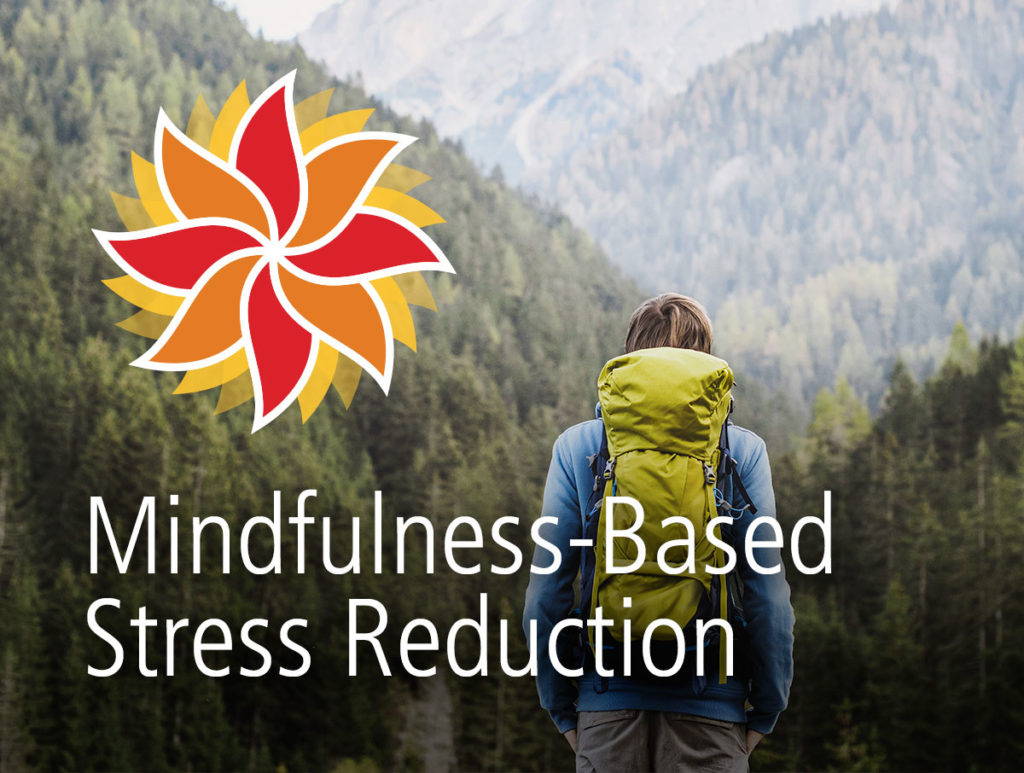Mindfulness Based Stress Reduction (MBSR)
Mindfulness-Based Stress Reduction (MBSR) is an 8-week evidence-based, experiential program designed to provide participants with intensive and systematic training in mindfulness meditation and movement practices.
Have a Question? Schedule an Advising Session.
Staff and faculty are available for advising sessions to help you explore mindfulness and take the next step in your mindfulness journey. Having trouble finding a date for an advising session that works? Contact Us
What Can I Learn in an Mindfulness Based Stress Reduction (MBSR) Program?
MBSR is an 8-week program of systematic training employing both formal meditations and informal mindfulness practices to cultivate present-moment awareness and to learn how to integrate what is discovered and learned through the process of participating in the program into one’s daily life. In addition to mindfulness techniques, MBSR also emphasizes the integration of the 9 Attitudinal Foundations. The experiential program harnesses inner resources and promotes resilience beyond the course.
What are the Benefits of an Mindfulness Based Stress Reduction (MBSR)?
While each participant’s experience is unique, our own experience and the published research has shown changes like these are common.
Better sleep • Lower blood pressure • Reduced symptoms of anxiety and depression • Pain Management • Responding skillfully vs reacting • Increased self-compassion • Enhanced focus, concentration, and resilience • Improved emotional regulation, and reduced rumination

The course was a very liberating experience, that allowed me to focus more on how I spend my time. Since the course I have been more intentional about what I am allowing in my space as I focus on living a more peaceful and purposeful life.
CM, MBSR Student, Fall 2023
How long is the MBSR program?
Mindfulness-Based Stress Reduction is an 8 week program plus an orientation. The class meets once per week for about two and a half hours. There is also an “All-Day” session on a Saturday or Sunday that lasts from about 9 AM to 4 PM.
The program consists of 31 hours of direct instruction, including:
- Orientation (1.5-2.5 hrs) scheduled one or two weeks before the first class
- 8 weekly classes, 2.5 hours each
- An all-day class on a Saturday or Sunday
- Daily home practice assignments (~45-60 minutes each day)
What is the Weekly Overview of Mindfulness Based Stress Reduction (MBSR)?
The MBSR curriculum presented here serves as a general overview and is subject to potential modifications based on the unique needs, insights, and discussions that may arise during class.
Orientation: Welcome and introductions
MBSR is introduced as a secular, evidence-based practice, including a discussion around the history and scientific basis of MBSR and how it can positively affect the quality of everyday life. Course logistics, expectations, and potential challenges of mindfulness practice are also reviewed.
Week 1: Building a mindfulness foundation
The definition of mindfulness is discussed, including what mindfulness is and is not and common misconceptions. Participants are also introduced to present moment awareness through experiential practices such as mindful eating, focused attention meditation, and body scan meditation.
Week 2: Perception and creative responding
Experiential mindfulness continues to be explored through meditation practices and self-reflections. The role of perception and assumptions and the way they can impact the present moment experience is introduced. The difference between reactivity and responsiveness is also discussed, and how mindfulness can create the space to respond more skillfully.
Week 3: The power of being present
Participants continue to engage with experiential mindfulness practices with opportunities to discuss the challenges and insights encountered in formal practice and in integrating mindfulness into everyday life. Participants will explore how to skillfully manage all ranges of experiences, and attention toward pleasant events that may go unnoticed is introduced.
Week 4: “The unwanted”
Unpleasant emotions and sensations are investigated with an emphasis on cultivating curiosity and openness to the full range of experiences. There is a review of the physiological and psychological effects of stress reactivity and participants are encouraged to identify their personal stress patterns. Strategies for responding positively and proactively with a mindful practice are also discussed.
Week 5: Dealing with difficult emotions or physical pain
Specific attention is provided on how to apply mindfulness when experiencing a strong physical sensation, intense emotion, or challenging thought. “Turning Toward” is introduced as a method to deliberately investigate these experiences rather than avoid them.
Week 6: Communication and interpersonal relating
Experiential training in MBSR continues with an emphasis on the growing capacity to self-regulate and cope more effectively with stress as it presents within the domain of communications – particularly difficult and challenging interpersonal exchanges. Communication styles and strategies are explored, including how mindfulness can foster thoughtful responses and help manage intense emotions.
All-Day: Slowing down and “being”
This 7.5 hour silent retreat provides participants with the opportunity to reinforce and build upon the mindfulness practices learned in the course by engaging with the established mindfulness practices and exploring some new ones. With reduced external demands and distractions, this day of practice helps to strengthen one’s use of mindfulness across multiple situations in daily life and may spark new insights and perceptions.
Week 7: Integrating mindfulness into daily life
In addition to cultivating a consistent daily meditation routine, participants explore various ways to cultivate a broader sense of awareness and presence in every moment. Participants will reflect on lifestyle choices and habits, discerning between those that are self-nourishing and maladaptive.
Week 8: Making the practice your own
Participants engage in the final experiential components of the program with opportunities for clarifying questions. Participants are guided to reflect about their mindfulness development and insights gained over the last 8 weeks. Key program topics are reviewed along with strategies for maintaining and deepening mindfulness skills beyond the program’s completion.
What are the Learning Objectives and Outcomes of Mindfulness-Based Stress Reduction (MBSR)?
- Utilize mindfulness to build awareness of stress responses, including recognizing habitual patterns of reactivity to stressors, and identifying and exploring unpleasant, unwanted, and contradictory emotions.
- Cultivate an understanding and awareness of the roles of intention, attention, and attitude.
- Utilize mindfulness to develop alternative responses to stress and promote greater mental flexibility.
- Discuss how thoughts and core beliefs can dictate the unconscious stress reactivity and conditioned ways of thinking may foster the habit of stress reactivity.
- Practice and employ meditation and mindfulness movement practices, bringing attention and awareness to how the body can hold stress.
- Bring awareness to the impact of judgement and non-judgement on awareness and bias.
- Apply mindfulness to cultivate a deeper connection with the body, emotions, and with others.
- Explain what mindfulness is and is not, from a theory- and evidence-based perspective, including the benefits of mindfulness and MBSR substantiated by empirical research.
Past Participant Testimonials
This course helped me deepen my practice. I had years of experience, but following a structured program and agreeing to commit to it brought me a lot more than I expected.
Amaury Dame, Participant
This MBSR course has helped me rekindle a loving relationship with my body, mind, and heart..
Program Participant
Mindfulness training has really changed the trajectory of both my personal and professional life. It has provided me the tools to be more self aware, along with sharp focus, clarity and attention. It was truly a pleasure and honor!
AT, Participant
What is the Science and Research on Mindfulness Based Stress Reduction (MBSR)?
MBSR has an extensive history of empirical validation, spanning over 40 years, including research supporting substantial psychological and physical benefits such as:
- Prosocial behaviors such as increased empathy and compassion toward others 1, 2
- Cognitive functions including enhanced focus, attentional control, and cognitive flexibility, as well as improvements in long and short-term memory processing and recollection 3, 4, 5
- Psychological health as a result of reduced stress and reduction in ruminating thoughts, as well as enhanced emotional regulation and increased resilience 3, 5, 7, 8
- Physical well-being including improved immune function, pain relief, and reduced blood pressure 9, 10, 11
While individual experiences may differ, engaging in mindfulness practices offers participants a valuable opportunity to tap into its wide-ranging benefits. The brain is not hard-wired. It’s possible to learn to be happier and healthier, more focused and resilient.
Sources Cited
- Lim, D., Condon, P., & DeSteno D. (2015). Mindfulness and Compassion: An Examination of Mechanism and Scalability. PlosOne, https://doi.org/10.1371/journal.pone.0118221
- Weng, H. Y., Fox, A. S., Hessenthaler, H. C., Stodola, D. E. & Davidson, R. J. (2015). The Role of Compassion in Altruistic Helping and Punishment Behavior. PlosOne, https://doi.org/10.1371/journal.pone.0143794
- Zou, Y. Li, P., Hofmann, S. G., & Liu, X (2020). The Mediating Role of Non-reactivity to Mindfulness Training and Cognitive Flexibility: A Randomized Controlled Trial. Front. Psychol, 11. https://doi.org/10.3389/fpsyg.2020.01053
- Greenburg, J., Romero, V. L., Elkin-Frankston, S., Bezdek, M. A., Schumacher, E. H., & Lazar, S. W. (2018). Reduced interference in working memory following mindfulness training is associated with increases in hippocampal volume. Brain Imaging and Behavior, 13, 366–376. https://doi.org/10.1007/s11682-018-9858-4
- Jha, A. P., Witkin, J. E., Morrison, A. B., Rostrup, N., & Stanley, E. (2017). Short-Form Mindfulness Training Protects Against Working Memory Degradation over High-Demand Intervals. Journal of Cognitive Enhancement, 1, 154–171. https://doi.org/10.1007/s41465-017-0035-2
- Ireland, M. J., Clough, B., Gill, K., Langan, F., O’Conner, A., & Spencer, L. (2017). A randomized controlled trial of mindfulness to reduce stress and burnout among intern medical practitioners. Medical Teacher, 39(4), 409-414. https://doi.org/10.1080/0142159X.2017.1294749
- Chambers, R., Lo, B. C. Y., & Allen, N. B. (2008). The Impact of Intensive Mindfulness Training on Attentional Control, Cognitive Style, and Affect. Cognitive Therapy and Research, 32, 303–322. https://doi.org/10.1007/s10608-007-9119-0
- Chin, B., Lindsay, E. K., Greco, C. M., Brown, K. W., Smyth, J. M. et al. (2019). Psychological mechanisms driving stress resilience in mindfulness training: A randomized controlled trial. Health Psychology, 38(8), 759–768. https://doi.org/10.1037/hea0000763
- Witek-Janusek, L., Albuquerque, K., Chroniak, K. R., Chroniak, C., Durazo-Arvizu, R., & Matthews, H. L. (2008). Effect of mindfulness based stress reduction on immune function, quality of life and coping in women newly diagnosed with early stage breast cancer. Brain, Behavior, and Immunity, 22(6), 969-981. https://doi.org/10.1016/j.bbi.2008.01.012
- Zeidan, F., Adler-Neal, A. L., Wells, R. E., Stagnaro, E., May, L. M., et al. (2016). Mindfulness-Meditation-Based Pain Relief Is Not Mediated by Endogenous Opioids. Journal of Neuroscience, 36(11) 3391-3397. https://doi.org/10.1523/JNEUROSCI.4328-15.2016
- Loucks, E. B., Nardi, W. R., Gutman, R., Kronish, I. M., Saadeh, F. B., et al. (2019). Mindfulness-Based Blood Pressure Reduction (MB-BP): Stage 1 single-arm clinical trial. PlosOne. https://doi.org/10.1371/journal.pone.0223095
Register or Join the Waitlist
Join Us to Learn More About Our Programs
Information Sessions
An Information Session or “Info Session” brings together program leaders, teachers and participants for presentations and conversations about our classes and your goals. Info Sessions are held several times a year and are a great place to learn about available classes.
About Information Sessions
Info Sessions are open to all and are designed for people considering which class to take. Info sessions are great for people with general questions about mindfulness, too.
If you are new to mindfulness, looking to understand the difference between classes, or just want to understand more about a particular class, an Info Session is for you.
MHI offers Information Sessions where you can learn about Teacher Training and our evidence-based and evidence-informed programs.

